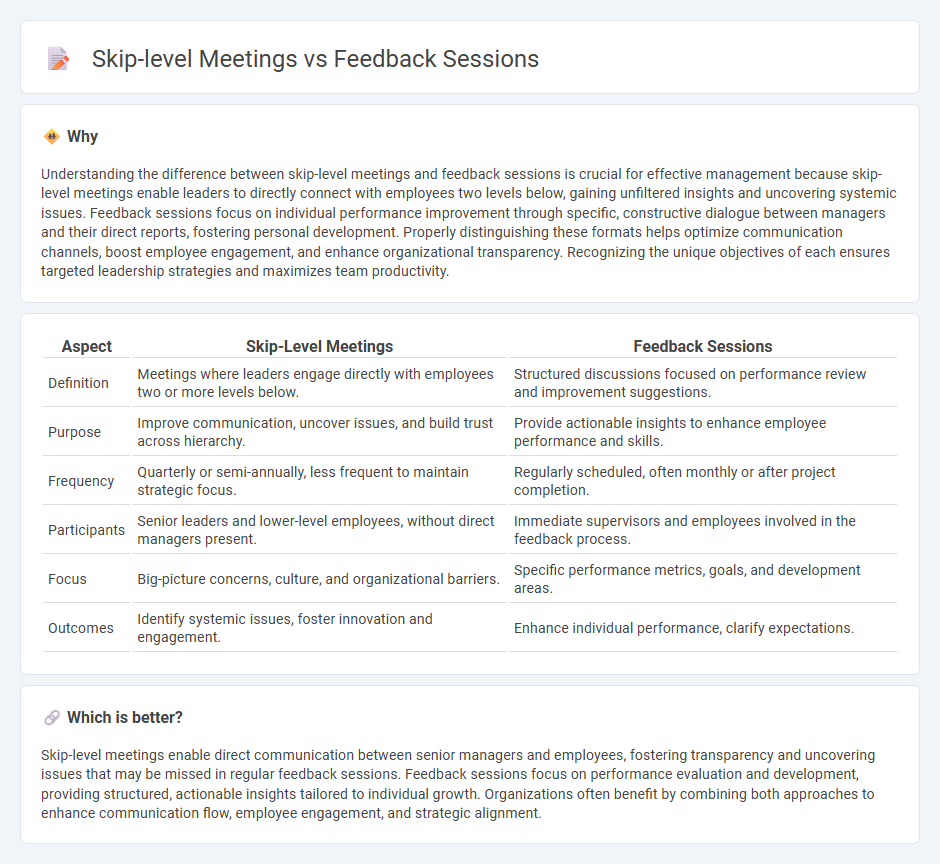
Skip-level meetings provide direct communication between senior leaders and employees two levels below, fostering transparency and uncovering hidden challenges within teams. Feedback sessions focus on individual performance review and development, facilitating meaningful improvements through constructive dialogue between managers and their direct reports. Explore how integrating these approaches can maximize organizational effectiveness and employee engagement.
Why it is important
Understanding the difference between skip-level meetings and feedback sessions is crucial for effective management because skip-level meetings enable leaders to directly connect with employees two levels below, gaining unfiltered insights and uncovering systemic issues. Feedback sessions focus on individual performance improvement through specific, constructive dialogue between managers and their direct reports, fostering personal development. Properly distinguishing these formats helps optimize communication channels, boost employee engagement, and enhance organizational transparency. Recognizing the unique objectives of each ensures targeted leadership strategies and maximizes team productivity.
Comparison Table
| Aspect | Skip-Level Meetings | Feedback Sessions |
|---|---|---|
| Definition | Meetings where leaders engage directly with employees two or more levels below. | Structured discussions focused on performance review and improvement suggestions. |
| Purpose | Improve communication, uncover issues, and build trust across hierarchy. | Provide actionable insights to enhance employee performance and skills. |
| Frequency | Quarterly or semi-annually, less frequent to maintain strategic focus. | Regularly scheduled, often monthly or after project completion. |
| Participants | Senior leaders and lower-level employees, without direct managers present. | Immediate supervisors and employees involved in the feedback process. |
| Focus | Big-picture concerns, culture, and organizational barriers. | Specific performance metrics, goals, and development areas. |
| Outcomes | Identify systemic issues, foster innovation and engagement. | Enhance individual performance, clarify expectations. |
Which is better?
Skip-level meetings enable direct communication between senior managers and employees, fostering transparency and uncovering issues that may be missed in regular feedback sessions. Feedback sessions focus on performance evaluation and development, providing structured, actionable insights tailored to individual growth. Organizations often benefit by combining both approaches to enhance communication flow, employee engagement, and strategic alignment.
Connection
Skip-level meetings foster direct communication between upper management and employees, bypassing immediate supervisors to uncover hidden insights and challenges. These interactions enhance transparency and encourage candid feedback, enabling leaders to make informed decisions that improve organizational performance. Regular skip-level feedback sessions also strengthen trust and align management strategies with employee needs and company goals.
Key Terms
**Feedback Sessions:**
Feedback sessions center on direct communication between managers and employees to discuss performance, strengths, and areas for improvement, fostering personal development and goal alignment. These sessions are scheduled regularly and rely on candid, constructive dialogue to boost employee engagement and productivity. Learn more about how effective feedback sessions can transform workplace dynamics.
Constructive Criticism
Feedback sessions and skip-level meetings both emphasize constructive criticism to foster professional growth. Feedback sessions allow direct managers to provide specific, actionable insights tailored to their team members' performance, enhancing individual development. Explore how structured feedback and skip-level dialogues differ in impact by learning more about their unique roles in organizational communication.
Performance Improvement
Feedback sessions directly address employee performance through targeted discussions tailored to individual growth areas, fostering continuous improvement and skill development. Skip-level meetings involve higher management engaging with employees beyond their immediate supervisors to uncover systemic issues, align goals, and enhance overall organizational performance. Explore the distinct advantages of both approaches to optimize your performance improvement strategy.
Source and External Links
Facilitating Discussion-Based Feedback Sessions with Students - This webpage provides guidance on structuring feedback sessions to gather insights from students through small-group discussions and reflective questions.
Ultimate Checklist for Impactful Feedback Sessions - This article offers a checklist for preparing and conducting effective feedback sessions, emphasizing planning, communication, and follow-up.
Using and Preparing Feedback Sessions Properly - This blog post discusses feedback sessions as an HR tool for self-development, performance improvement, and conflict resolution, with tips on constructive feedback.
 dowidth.com
dowidth.com